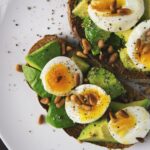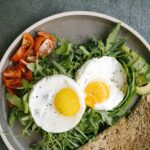
You may have heard a lot about the importance of breakfast. Indeed, it is an essential meal that should never be neglected.
To be in good shape, it’s best to start the day with an excellent meal.
Why eat a balanced breakfast?
The first role of breakfast is to allow the body to recover energy and nutrients after the nightly hunger to cover the morning’s needs.
The proper functioning of the brain and other organs, movement, and cellular recovery requires energy provided by food. They also provide us with the essential nutrients to our body: carbohydrates, proteins, lipids, fiber, vitamins, and minerals.
The body needs excellent quality fuel to perform mental and physical work. We must offer it a balanced, varied, and sufficient diet, starting with a good breakfast.
A balanced breakfast is also the solid foundation of the day: if you eat well in the morning, your appetite will be better regulated, and you will be less prone to snacking.
How many calories should a breakfast provide?
One of the principles of a balanced diet is the total distribution of energy intake (measured in calories or Kcal) throughout the day.
For breakfast, it is recommended to provide 20 to 25% of the calories for the whole day. For example, a person who consumes 1800 Kcal should provide his body with 360 to 450 Kcal at breakfast.
There is no golden rule because energy needs vary according to weight, age, sex, and physical activity (which is not the same every day).
You don’t have any appetite when you get out of bed? Don’t worry, you can postpone it until later in the morning, or take a little less than 20 to 25% of your daily intake in the morning. Indeed, the energy balance must take into account the whole day.
What does a balanced breakfast consist of?
A balanced meal should provide carbohydrates (sugars, starches, and fiber), proteins, fats, vitamins, and minerals. For a balanced, nutrient-rich breakfast, you should know the sources of the different nutrients.
1- Carbohydrates
Bread and cereals provide you with starches (or slow sugars) and some fast sugars. Choose whole grain products and those rich in cereals because they offer more fiber.
Fresh or dehydrated fruit contains fructose, fiber, vitamins, and minerals. They are perfect for starting the day.
2- Protein
Eggs are the most complete protein because they contain all the amino acids. It is also versatile: it can be prepared in different ways or integrated into sweet or savory recipes.
Dairy products are good sources of protein, calcium, and vitamin D.
3- Lipids (or fats)
Don’t be afraid! Your cells need them. But consume good fats like butter, nuts (walnuts, hazelnuts, almonds, etc.), seeds (sunflower, flax), and avocado. They provide energy and fat-soluble vitamins.
4- Hydration
You can start your day with a large glass of water or a cup of hot water. Then, with your breakfast, have coffee, tea, or herbal tea (if possible, without added sugar). If you like fruit juices, be aware that they are high in sugar, even the homemade ones (without added sugar), but consume them in moderation.
What to take for a balanced breakfast?
Breakfast should adapt to several factors specific to each person: hunger (small hunger = small meal), type of activity (sedentary or sporty), tastes (sweet or salty), season, schedule, etc.
Following the principles explained above, you can take in the morning :
1- A source of protein
- Eggs are an excellent choice.
- A dairy product: milk (cow’s milk if you can tolerate it, otherwise sheep’s or goat’s milk), yogurt, or cottage cheese at the end of the meal. For those who like salty foods, a portion of cheese.
2- Good fats
- A knob of butter or a spoonful of plain dried fruit puree (almond, peanut) on toast is a healthy and tasty option.
- Nuts (walnuts, hazelnuts, almonds), seeds (flax, sesame, sunflower). You can add them to yogurt or cereals.
3- A cereal product
- Bread or bread-like products: rusks, toast, or crackers. Preferably wholemeal or cereal bread.
- Whole grain cereals: ideally oatmeal or flaky mueslis with no added sugar.
- Whole wheat flour or oatmeal recipes: pancakes, plain cakes, bowl cakes, etc.
4- Small bonuses, in case of hunger
- Fresh seasonal fruit or dehydrated fruit (raisins, dates, prunes). They give you more satiety than compotes and juices.
- For those who prefer sweets: a small amount of quick sugars such as honey or fruit-rich jam.
- A hot drink: light coffee, tea, or herbal tea, if possible, without added sugar.
Ideas for a balanced breakfast
The composition of a balanced breakfast is ideal for an adult with average needs. However, there are variations according to particular needs.
A balanced breakfast for children
Don’t be impressed by fancy packaging. It is better to introduce your children to natural foods.
- If you give them bread, vary the types, white and wholemeal: children also need fiber, and ask your baker if the bread he kneads contains additives or sugar. The better option is bread without additives. You can accompany it with farm butter and homemade jam.
- If your children like cereals, you must remain vigilant. Unfortunately, most of the products aimed at children are too sweet and often ultra-processed. Try unrefined products. For some sweetness add dried fruit or chocolate chips.
- As they need calcium, include milk or dairy products at breakfast. Choose plain milk, because flavored versions are often sweeter and contain additives.
- Finally, add a piece of fruit: introduce your children to seasonal fruits. Fruit juice should be a minority choice and not replace a whole fruit.
A balanced breakfast for athletes
Athletes have increased needs: sport requires performance energy and also for recovery. They need proteins for strength and muscle structure, carbohydrates as fuel for the muscles, and lipids to provide energy and improve cellular functioning.
Specific energy and nutrient intakes depend on the type of sport, intensity, frequency, and individual factors (age, gender, weight, etc.). But in each case, breakfast should be well balanced, with :
- Natural sources of protein like eggs, dairy, cheese, ham, or chicken breast. Plus, protein powders should be used only if you cannot meet your daily protein requirements.
- Essential carbohydrates. It is interesting to bring fast sugars (dried or fresh fruits) and slow sugars (wholemeal bread, oats) during the same meal to improve the muscular response to the effort.
- Fats are a good complement to energy intake. Also choose good quality fats: butter, vegetable oils, natural or pureed nuts, and seeds.
Another tip: don’t eat a large breakfast just before going to the gym.
If you work out early in the morning, have a small snack (nuts, Greek yogurt, dehydrated fruit) before you leave and eat breakfast when you get back to recover.
Wait at least an hour (or two) before going to the gym, and eat breakfast first.
A balanced breakfast to lose weight
Even with a slimming objective, breakfast is important. Be very careful, because there are many wrong ideas, such as:
“You have to fast to lose weight”: False. Even if some people can benefit from fasting, it is not used in the context of slimming. If you’re really hungry in the morning or if you’re going to work out, your body will thank you for having a good breakfast.
“You have to take low-fat products to lose weight”: False. They won’t make you lose weight, unlike a balanced diet! They contain calories just like other products, so consume them in moderation. In addition, this type of product often contains additives (sweeteners, thickeners, dyes, etc.), so it is better to choose a more natural product.
“Whole grain products are low in calories”: False. They have almost the same amount of calories as refined products. However, their strong point is their fiber content, which offers more satiety.
So your breakfast doesn’t have to be that different from a classic balanced breakfast. However, there are two keys to your slimming goal:
- Pay attention to quantities. Some products are denser in calories, such as butter, mueslis, dried fruits, and seeds. Consume them in moderation.
- Choose the products that “calm” you down the most: favor foods rich in fiber and those that provide protein.
A quick balanced breakfast!
Lack of time is one of the common excuses for not eating in the morning. Sometimes it motivates us to eat “on the go” like industrial cakes, cereal bars, or ready-to-eat products: pastries, muffins, etc.
But remember, your body needs good-quality fuel. Here are some ideas for a healthy, quick breakfast:
1- Overnight oats or no-cook porridge
Take a glass jar and soak oatmeal in milk (or a vegetable drink) or yogurt overnight in a cool place. The next morning, add some seeds, dried or fresh fruit pieces. Enjoy it immediately, or close the jar for a porridge to go!
2- An energy smoothie
Put in a blender a portion of fresh or frozen fruit, a few spoonfuls of oatmeal or chia seeds, and add yogurt or cow or plant milk. Mix well, and it’s ready to drink or keep in your water bottle for later.
3- The good homemade cake
If you’re into batch-cooking, consider making your favorite cake on the weekend so you can eat a few slices on the weekday morning. For a good breakfast, prefer fruit, nut, or chocolate chip cakes, rich in energy to start the day. The advantage of homemade cakes is combining deliciousness with nutritional quality!


